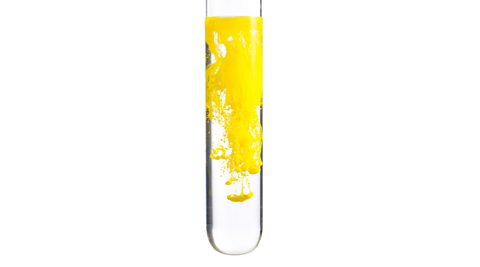Solubility rules
Solubility
A substance's solubilityThe mass of solid needed to saturate 100 g of water at a given temperature. is a measure of the maximum massThe amount of matter an object contains. Mass is measured in kilograms (kg) or grams (g). that will dissolve in a given volume of solventThe liquid in which the solute dissolves to form a solution., at a particular temperature. Substances that are very solubleAble to dissolve in solvent. For example, sugar is soluble in water because it dissolves to form sugar solution. have high solubilities. Substances that are insolubleUnable to dissolve in a particular solvent. For example, sand is insoluble in water. or sparingly soluble (almost none dissolves) have low solubilities.
Solubility in water
The table summarises whether common ionic compoundAn ionic compound occurs when a negative ion (an atom that has gained an electron) joins with a positive ion (an atom that has lost an electron). are soluble or insoluble in water.
| Soluble | Insoluble |
| All common sodium, potassium and ammonium salts | |
| All nitrates | |
| Most common chlorides | Silver chloride, lead chloride |
| Most common sulfates | Lead sulfate, barium sulfate, calcium sulfate |
| Sodium carbonate, potassium carbonate, ammonium carbonate | Most common carbonates |
| Sodium hydroxide, potassium hydroxide, ammonium hydroxide | Most common hydroxides |
| Soluble | All common sodium, potassium and ammonium salts |
|---|---|
| Insoluble |
| Soluble | All nitrates |
|---|---|
| Insoluble |
| Soluble | Most common chlorides |
|---|---|
| Insoluble | Silver chloride, lead chloride |
| Soluble | Most common sulfates |
|---|---|
| Insoluble | Lead sulfate, barium sulfate, calcium sulfate |
| Soluble | Sodium carbonate, potassium carbonate, ammonium carbonate |
|---|---|
| Insoluble | Most common carbonates |
| Soluble | Sodium hydroxide, potassium hydroxide, ammonium hydroxide |
|---|---|
| Insoluble | Most common hydroxides |
The top two rows explain why so many saltThe substance formed when the hydrogen ion in an acid is replaced by a metal ion. solutionMixture formed by a solute and a solvent. used in the laboratory are sodium or potassium compoundA substance formed by the chemical union of two or more elements. or nitrates.
Precipitates
A precipitateA suspension of particles in a liquid formed when a dissolved substance reacts to form an insoluble substance, eg in a precipitation reaction. is an insoluble productA substance formed in a chemical reaction. that forms when two solutions are mixed and react together. The reaction that produces a precipitate is called a precipitation reactionA reaction in which an insoluble solid is formed when certain solutions are mixed..
For example, a precipitate of lead iodide forms when potassium iodide solution and lead nitrate solution are mixed:
potassium iodide + lead nitrate → potassium nitrate + lead iodide
2KI(aq) + Pb(NO3)2(aq) → 2KNO3(aq) + PbI2(s)
Notice how important state symbolA symbol used in chemical equations to show if a substance is a solid, a liquid, a gas, or an aqueous solution. are in the balanced chemical equationA chemical equation written using the symbols and formulae of the reactants and products, so that the number of units of each element present is the same on both sides of the arrow. for precipitation reactions. Without the (s) for solid, it would not be obvious that PbI2 (lead iodide) was the precipitate.

Predicting precipitates
The formation of a precipitate, when two solutions are mixed, can be predicted using the solubility rules in the table:
- if the products meet the 'soluble' rules in the left hand column, no precipitate will form
- if at least one product meets the 'insoluble' rule in the right hand column, a precipitate will form
Worked example
Silver nitrate solution is mixed with sodium chloride solution. Predict whether a precipitate forms and name any precipitate.
Worked example answer
A precipitate of silver chloride will form.
Question
Potassium sulfate solution is mixed with barium chloride solution. Predict whether a precipitate forms, and name any precipitate.
A precipitate of barium sulfate will form.